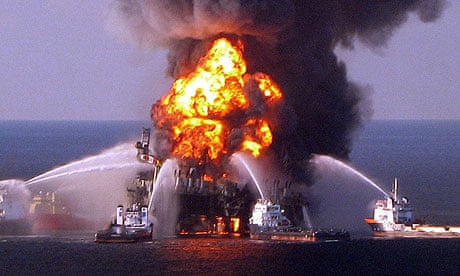BP is to link staff bonuses just to improvements in safety standards in its fourth quarter, in an attempt to improve its reputation after the Gulf of Mexico disaster.
Bob Dudley, BP's new chief executive, announced the move in an email to employees seen by the Wall Street Journal. He said the sole criterion for judging performance in the fourth quarter would be "each business's progress in reducing operational risks and achieving excellent safety and compliance standards".
The oil company, still reeling from the Gulf spill and accusations that it put profit before safety, is reviewing whether its executive bonus scheme puts sufficient weight on its safety record. BP's last annual report said "key safety measures" accounted for 15% of bonuses but 70% was for financial and operational targets.
Dudley, who replaced Tony Hayward last month, marked his arrival by ousting the head of exploration and production and announcing a major restructuring to give safety a higher priority. This included setting up a new safety division with powers to intervene in operations. BP is also carving up the exploration division, which industry insiders say has become a semi-autonomous unit, and reviewing its use of contractors in light of the disaster, the worst oil spill in American history.
Its rival, Royal Dutch Shell, has long linked bonuses to safety, while Exxon Mobil is known to insist on compliance.
Some American commentators want BP barred from drilling in the US in future. With 40% of its assets there, such a move could cripple the company. Some U.S. lawmakers have argued the oil spill, a refinery blast in 2005, and Alaskan oil spills in 2006, reflect a corporate culture that encouraged managers to put profits before safety.
"Bob Dudley, the new CEO, is determined to mend the company's fences with the current US administration," said David Buik, at BGC Partners.
While BP finally managed to cap the burst oil well in the Gulf in July, the group is expected to feel the consequences of the disaster – the reputational damage – for a long time to come. It pulled out of plans to bid for a licence to drill in Arctic waters off the Greenland coast, fearing that it would be too controversial.
Meanwhile, BP told a US court today that it would waive the legal cap on its liability from the Gulf spill, which could have limited the cost to the firm to $75m (£48m) plus clean-up costs. BP has already paid out hundreds of millions of dollars to fisherman, retailers, charter boat captains and property owners who were hit by the spill.
The company has publicly committed to pay clean-up costs and all "legitimate claims," rather than applying the cap.
Under pressure from the Obama administration, the firm has established a $20bn compensation fund, but a slew of lawsuits also have been brought against BP.
At a court hearing on the lawsuits on Friday, BP created confusion about its stance on the liability cap. It did not commit to waiving the cap at the hearing, as many plaintiffs' attorneys had expected, and said in a statement then that the cap "is not relevant".
Steve Herman, a Louisiana attorney leading hundreds of lawsuits against BP and its partners, said: "BP lawyers wouldn't say on the record they would waive the cap. It certainly took everyone by surprise."
In Mon's filing at the US district court in Louisiana, BP said it would waive the liability cap. BP also urged other defendants in the case, including the rig owner Transocean Holdings, Anadarko Petroleum and MOEX Offshore, to waive the liability cap, according to the filing.
BP also said it reserved the right to seek reimbursement from the other defendants and denied engaging in grossly negligent conduct, which would open the door to potentially huge punitive damages.

Comments (…)
Sign in or create your Guardian account to join the discussion